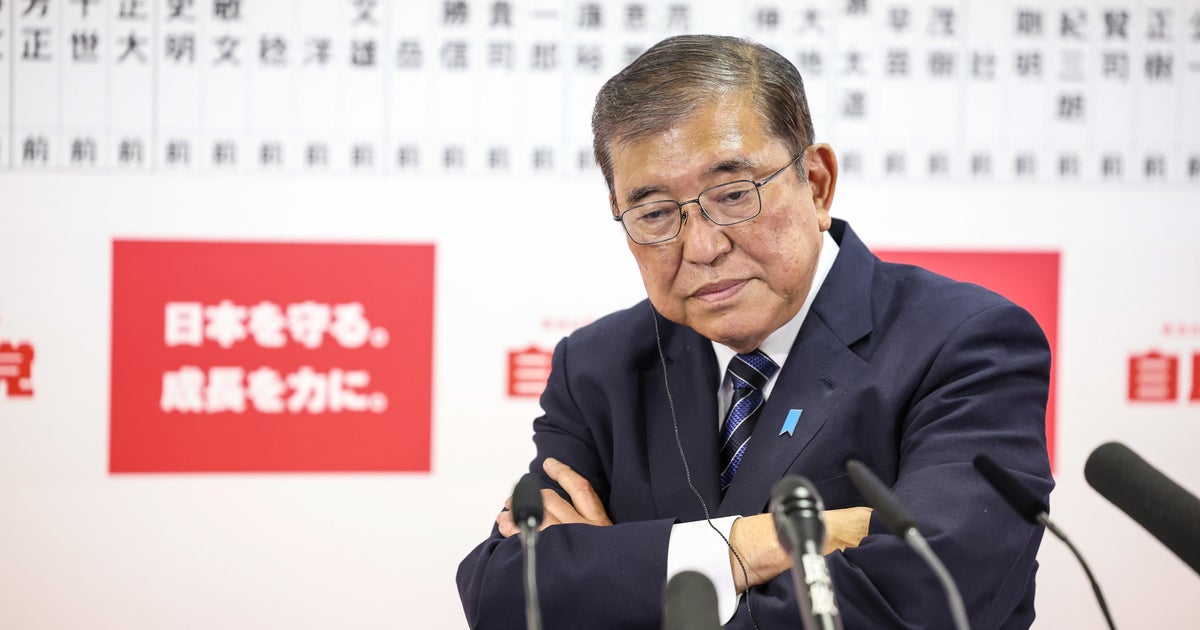CBS News
Shigeru Ishiba elected Japan’s prime minister by Parliament after predecessor’s administration was rocked by scandals

Tokyo — Japan’s parliament formally elected Shigeru Ishiba, head of the governing Liberal Democratic Party, as the country’s new prime minister Tuesday.
Ishiba was chosen as the party’s leader Friday to replace Fumio Kishida, who stepped down along with his Cabinet earlier in the day to pave the way.
Kiyoshi Ota / Bloomberg via Getty Images
Ishiba was to announce his new Cabinet later on Tuesday.
Kishida took office in 2021 but is leaving so his party can have a fresh leader after his government was dogged by scandals. Ishiba plans to call a parliamentary election for Oct. 27.
“I believe it is important to have the new administration get the public’s judgment as soon as possible,” Ishiba said Monday in announcing his plan to call a snap election. Opposition parties criticized Ishiba for allowing only a short period of time for his policies to be examined and discussed in parliament before the national election.
Kishida left his office after a brief send-off ceremony in which he was presented with a bouquet of red roses and applauded by his staff and former Cabinet members.
“As we face a critical moment in and outside the country, I earnestly hope key policies that will pioneer Japan’s future will be powerfully pursued by the new Cabinet,” Kishida said in a statement, citing the need to bolster security amid a deepening global divide, such as Russia’s war in Ukraine, while tackling a declining birthrate and population, as well as economic and political reforms at home.
Ishiba earlier announced his party’s leaders ahead of naming his Cabinet.
The majority of his Cabinet ministers are expected, as is Ishiba, to be unaffiliated with factions led and controlled by party heavyweights, and none are from former Prime Minister Shinzo Abe’s powerful group, which has been linked to damaging scandals.
Ishiba’s lack of a stable power base could also mean a fragility of his government and “could quickly collapse” even though Ishiba hopes to build up party unity as it prepares for the upcoming election, the liberal-leaning Asahi newspaper said.
The move is also seen as a step toward revenge by Ishiba, who was largely pushed to the side during most of Abe’s reign.
Ishiba has proposed an Asian version of the NATO military alliance and more discussion among regional partners about the use of the U.S. nuclear deterrence. He also suggested a more equal Japan-U.S. security alliance, including joint management of U.S. bases in Japan and having Japanese Self Defense Force bases in the United States.
Ishiba outlined his views in an article to the Hudson Institute last week. “The absence of a collective self-defense system like NATO in Asia means that wars are likely to break out because there is no obligation for mutual defense. Under these circumstances, the creation of an Asian version of NATO is essential to deter China by its Western allies,” he wrote.
Ishiba proposes combining of existing security and diplomatic groupings, such as the Quad and other bilateral and multilateral frameworks involving the United States, Australia, New Zealand, South Korea and the Philippines.
He also noted that the Asian version of NATO could also consider sharing of the control of U.S. nuclear weapons in the region as a deterrence against growing threats from China, North Korea and Russia.
Ishiba on Friday stressed that Japan needs to reinforce its security, noting recent violations of Japanese airspace by Russian and Chinese warplanes and repeated missile launches by North Korea.
He pledged to continue Kishida’s economic policy aimed at pulling Japan out of deflation and achieving real salary increases while tackling challenges such as Japan’s declining birthrate and population and resilience to natural disasters.
The LDP has had a nearly unbroken tenure governing Japan since World War II. Party members may have seen Ishiba’s more centrist views as crucial in pushing back challenges by the liberal-leaning opposition and winning voter support as the party reels from scandals that drove down Kishida’s popularity.
Ishiba, first elected to parliament in 1986, has served as defense minister, agriculture minister and in other key Cabinet posts, and was LDP secretary general under Abe.
CBS News
Two women testified to House panel that Matt Gaetz paid them for sex, attorney says

Watch CBS News
Be the first to know
Get browser notifications for breaking news, live events, and exclusive reporting.
CBS News
Should you take out a mortgage loan now or wait until 2025?

Getty Images
For most of 2023 and early 2024, looking for a low mortgage rate was a quest for the impossible. Surging inflation sent rates soaring to their highest level in decades and finding a loan under 7.00% was a fantasy for most would-be buyers.
Fortunately, there has been some improvement in the mortgage market in recent months. In anticipation of the Federal Reserve’s rate cuts in September, mortgage rates dipped, opening up the door to more affordable home loans and even some refinancing opportunities. Rates then fell over a point off their post-pandemic highs, providing hope for would-be buyers.
However, mortgage rates began to rise again in October. While today’s mortgage rates remain below recent highs right now, many borrowers have been left wondering whether they should jump into the market or wait for rates to fall further — especially as the Fed has signaled additional rate cuts are likely through 2025.
Find out how affordable a mortgage loan could be today.
Should you take out a mortgage loan now or wait until 2025?
If you’re on the fence about whether to buy now or delay further, here’s why experts say that waiting may not pay.
There’s no guarantee rates will fall
With the Federal Reserve widely expected to cut rates again in the future, waiting may seem like the obvious course of action. However, there’s no guarantee these anticipated rate cuts will happen — or that they will have the desired effect on the mortgage market since the Fed doesn’t directly control the cost of home loans.
“The challenge with “waiting to buy” is always the same. No one can predict the future, even the greatest financial minds,” says Aaron Gordon, branch manager at Guild Mortgage. “Just look at the last two months. Rates touched an 18-month low in early September. Folks got excited. Pending sales rose to their highest levels all year. Others said ‘they’re still not low enough. I’m going to wait a little longer until they come down more.’ Just weeks later they jumped from the low 6’s to the low 7’s.”
While the Fed followed through with an anticipated rate cut at its November meeting, the recent election could also impact further proposed reductions in the benchmark rate, depending on what policies are enacted in 2025.
With no guarantee that mortgage rates will fall further, Gordon says the best thing to do is to buy “when you’re financially and emotionally ready.”
Compare the top mortgage rates available to you now.
Rate decreases may happen slowly
Delaying your home purchase in anticipation of declining costs could also be a poor strategy because you may have to wait much longer than you’d expect.
“Rates between now and the start of the new year aren’t likely to fluctuate too significantly,” says Evan Luchaco, an Oregon-based home loan specialist for Churchill Mortgage.
Chris Birk, vice president of mortgage insight at Veterans United Home Loans, also doesn’t believe a drop in rates is imminent next year either.
“Buyers waiting for a major drop in mortgage rates should understand that a sudden decline isn’t likely around the corner,” Birk says. “If mortgage rates come down in 2025, it’ll likely be a slow roll.”
Delaying your dream of homeownership for months means missing out on the chance to start building equity — and potentially missing out on a property you love.
“Finding the right home is the most important aspect of the home buying process,” Luchaco says. “A home that achieves your goals for the immediate future will help get you to where you want to be long term.”
Lower mortgage rates could cause a spike in home prices
There’s another important financial reason not to put off your purchase. While a lower mortgage rate could mean reduced borrowing costs, this could be offset by changes in the housing market that a rate drop brings.
“Waiting to buy might not wind up being worth it for a simple reason – rising home prices,” Birk says. “Depending on your price range, your market, and other factors, higher home prices might offset any dip in interest rates. The $400,000 house you love today might cost way more next summer between home price appreciation and the crush of buyers that lower rates might bring.”
Darren Tooley, a senior loan officer at Cornerstone Financial Services, notes that prices could rise rapidly next year.
“Historically, home values have gone up 6.24% in the year following a presidential election, but 2025 could exceed that due to the limited housing supply and an increase in buyer competition,” Tooley says.
According to Tooley, mortgage applications increased by almost 50% when rates hit recent lows at the end of September. While some of this change was explained by a spike in refinancing, most of the new loans were for new purchases.
“It’s clear when rates go down, more potential homebuyers will be flooding the market, which will ultimately continue to drive up home prices, making things more expensive next year despite the lower rate,” Tooley says.
The bottom line
Finally, there’s one last important reason not to delay. Buying a home now allows you to lock in today’s prices while opening up the door for a more affordable loan later.
“Today’s homebuyers will almost certainly be able to refinance down the road,” Birk said. “Buying today, with the flexibility to refinance later, could offer a balanced path forward in an uncertain rate environment.”
CBS News
Jennifer Lawrence and Malala Yousafzai on their new documentary about Afghan women

Watch CBS News
Be the first to know
Get browser notifications for breaking news, live events, and exclusive reporting.









